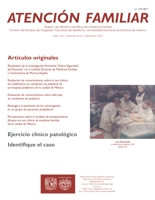Perceptions on the Life-Span Aging Model of a Primary Care Unit in Mexico City
Main Article Content
Abstract
Objective: identify perceptions about the aging process in adults from 20 to 59 years. Material and methods: descriptive, observational, prospective, and cross-sectional study. Sample made through casual, nonrepresentative selection with 95% of reliability, precision of 7% and variability with p and q of 0.8 and 0.2 of 125 patients of a Primary Care Unit in Mexico City. It was studied 29 variables: socio-demographic, health conditions, family data, and perception of the aging process. It was made a questionnaire consisting of five sections and 66 questions, with Likert scale type. There was a single measurement by direct examination. Results: average age, 39.9 years. The perception of age for the beginning of aging was identified after age 60 in 33% of the interviewed people. The aging model was perceived optimistically by 95% of the sample. Physical changes were perceived negatively in 50.4% of the cases. Conclusions: there was a tendency to perceive aging in a positive way with the life-span model. The participants with a medium or higher education and those who got more than eight times the daily minimum wage presented greater tendency to perceive social changes in life-span model.
